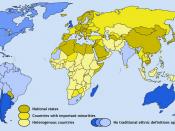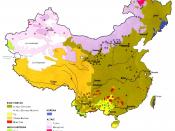This essay will endeavour to explain what historians mean when they use the terms "nation" and "nationalism". Historians have often divided the populace of certain areas into states referred to as nations, and this has set up the foundation for the ideology of nationalism. The members of a nation are recognized by common characteristics, and almost always by a similar beginning, in the sense of lineage or background. The nations character or identity refers both to the unique features of the group, and to the individual's sense of loyalty or attachment to it.
The definition of a nation has diverse meanings when mentioned by historians. It may be used to refer to a large group of people organized under a single government. It could also be used to refer to a group of people who share customs, language, and a common origin. In addition it could also take on the meaning of the territory itself of a particular region.
Regardless of these separate meanings, they all commonly refer to a localized country and people, in which there are certain factors and origins, which are thought to be binding. Even so when historians use the term nation it is can often be used to describe a certain ethnic group of people, not always intending to refer to a nation as a sovereign country, for example the Native American Indians are categorized as belonging to indigenous nations like the Navaho and Apache. These nations as described as such because of the uniqueness in their ethnicity, cultural or social identity an indigenous nation within a sovereign nation.
This nation within a nation concept is often found throughout history, where nations are made up of different 'nations' or 'nationalities per say', each being a citizen of their nation but having a different ethnic background...


